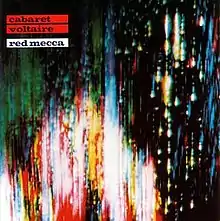Red Mecca
Red Mecca is the third studio album by English industrial band Cabaret Voltaire, released in September 1981 through Rough Trade Records.
| Red Mecca | ||||
|---|---|---|---|---|
 | ||||
| Studio album by | ||||
| Released | September 1981 | |||
| Recorded | May 1981 | |||
| Studio | Western Works, Sheffield, England | |||
| Genre | Industrial, post-punk | |||
| Length | 40:11 | |||
| Label | Rough Trade | |||
| Producer | Cabaret Voltaire | |||
| Cabaret Voltaire chronology | ||||
| ||||
Background
While touring the United States in November 1979, Cabaret Voltaire became strongly interested in the rise of the Christian right and its use of television, especially the fund-raising broadcasts of TV evangelist Eugene Scott.[1] They compared this to the rise of Islamism, devoting a side to each strand of religious politics on their 1980 mini-album Three Mantras. Red Mecca was a culmination of this interest. According to Richard H. Kirk: "The whole Afghanistan situation was kicking off, Iran had the American hostages [...] we were taking notice [...] it's not called [Red Mecca] by coincidence. We weren't referencing the fucking Mecca Ballroom in Nottingham!"[2]
Red Mecca was recorded at Western Works in Sheffield in May 1981.
Release
Red Mecca reached No. 1 on the UK Independent Albums chart.[3]
Critical reception
| Review scores | |
|---|---|
| Source | Rating |
| AllMusic | |
| Blender | |
| Record Collector | |
| The Rolling Stone Album Guide | |
| Select | 3/5[8] |
| Spin Alternative Record Guide | 9/10[9] |
| Uncut | |
NME named Red Mecca the ninth best album of 1981.[11]
Andy Kellman of AllMusic retrospectively praised the album, writing, "Unlike a fair portion of CV's studio output, Red Mecca features no failed experiments or anything that could be merely cast off as 'interesting.' It's a taught [sic], dense, horrific slab lacking a lull."[12] Uncut cited Red Mecca as Cabaret Voltaire's "masterpiece", where the band "struck the perfect balance between experimentalism and entryism".[10] Record Collector's Ian Shirley called it "a seismic release" and noted "its timeless sheen, with the Cabs' use of echo, space and phasing lending depth and vibrancy to the album."[6] In 2019, Pitchfork ranked Red Mecca as the fourth best industrial album of all time, deeming it a "paranoid, claustrophobic masterpiece".[1]
Track listing
All tracks are written by Cabaret Voltaire (Chris Watson, Richard H. Kirk, Stephen Mallinder), except "A Touch of Evil" and "A Touch of Evil (Reprise)" by Henry Mancini.
| No. | Title | Length |
|---|---|---|
| 1. | "A Touch of Evil" | 3:11 |
| 2. | "Sly Doubt" | 4:59 |
| 3. | "Landslide" | 2:08 |
| 4. | "A Thousand Ways" | 10:35 |
| No. | Title | Length |
|---|---|---|
| 1. | "Red Mask" | 6:54 |
| 2. | "Split Second Feeling" | 3:47 |
| 3. | "Black Mask" | 3:19 |
| 4. | "Spread the Virus" | 3:40 |
| 5. | "A Touch of Evil (Reprise)" | 1:32 |
Personnel
- Cabaret Voltaire
- Christopher R. Watson – organ, tape, production, recording, sleeve design
- Richard H. Kirk – synthesizer, guitar, clarinet, horns, strings, production, recording, sleeve design
- Stephen Mallinder – vocals, bass guitar, bongos, production, recording, sleeve design
- Additional personnel
- Nik Allday – drums
- Porky – mastering
- Neville Brody – sleeve design
References
- "The 33 Best Industrial Albums of All Time". Pitchfork. 17 June 2019. p. 3. Retrieved 30 November 2020.
- Reynolds, Simon (2005). Rip It Up and Start Again: Postpunk 1978–1984. Faber and Faber. pp. 171–72. ISBN 0571215696.
- Lazell, Barry (1997). Indie Hits 1980–1989. Cherry Red Books. p. 311. ISBN 0-9517206-9-4.
- Kellman, Andy. "Red Mecca – Cabaret Voltaire". AllMusic. Retrieved 30 March 2018.
- Howe, Rupert (April–May 2002). "Cabaret Voltaire: (Various)". Blender. No. 6. Archived from the original on 10 February 2003. Retrieved 4 December 2020.
- Shirley, Ian (September 2013). "Cabaret Voltaire – Red Mecca". Record Collector. No. 418. Retrieved 4 March 2020.
- Considine, J. D. (2004). "Cabaret Voltaire". In Brackett, Nathan; Hoard, Christian (eds.). The New Rolling Stone Album Guide (4th ed.). Simon & Schuster. pp. 128–29. ISBN 0-7432-0169-8.
- Finlay, Leo (July 1990). "Praying To Mecca". Select. p. 122.
- Sinker, Mark (1995). "Cabaret Voltaire". In Weisbard, Eric; Marks, Craig (eds.). Spin Alternative Record Guide. Vintage Books. pp. 67–68. ISBN 0-679-75574-8.
- "Cabaret Voltaire: Red Mecca". Uncut. No. 69. February 2003. p. 92.
- "1981 Best Albums And Tracks Of The Year". NME. 10 October 2016. Retrieved 14 February 2018.
- Cabaret Voltaire - Red Mecca Album Reviews, Songs & More | AllMusic, retrieved 16 April 2023